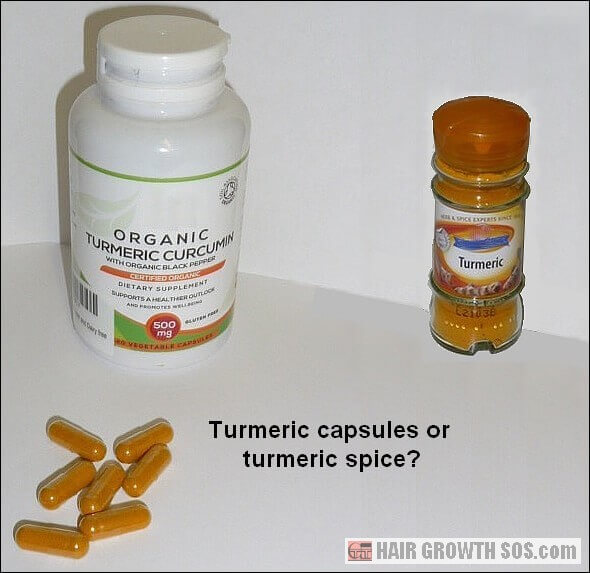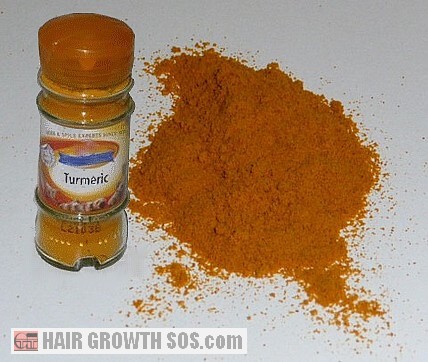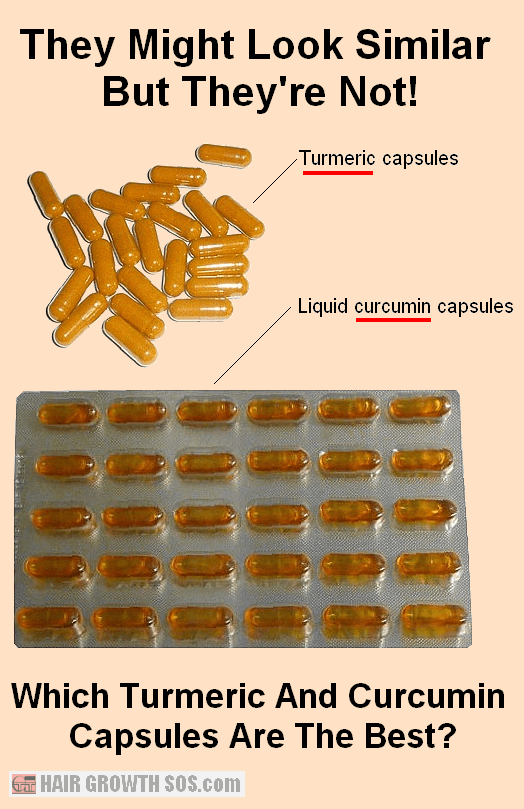Will Turmeric and Curcumin Cause Hair Loss or Hair Growth?
By Paul Taylor

Taking turmeric and Curcumin for hair loss? Some reviews report curcumin benefits hair growth. Others say it causes their hair loss to get worse.
So which is true?
Many people try turmeric and curcumin supplements in the hope that they can stop their hair loss and restore a healthy head of hair again.
This review looks at the facts and discusses whether the ancient Indian spice turmeric is really worth trying.
Specifically, it answers the following questions:
What is curcumin? And what are turmeric's benefits?
Can curcumin help with hair loss?
Can curcumin cause hair loss?
What are the best turmeric and curcumin supplements to take?
What Is Curcumin? And What Are Turmeric's Benefits?
First of all, curcumin is not the same as cumin. The table below shows a few differences between the two:
Curcumin
Family: Ginger
Region: Tropical Asia
Therapeutic part of plant: Root
Cumin
Family: Parsley
Region: Mediterranean to central Asia
Therapeutic part of plant: Seeds
Curcumin forms part of the Indian spice turmeric. Turmeric contains three "curcuminoids", all of which are biologically active in the human body.
Over the centuries, the healing properties of turmeric, and specifically the curcumin component, have been used for many things to help heal human disorders.
More recently, scientific studies have been made with some promising results. Some turmeric studies have addressed:
- Inflammation
- Osteoarthritis
- Digestive disorders
- Autoimmune disorders
- Cancer
- Type 2 diabetes
- Mental disorders including depression and Alzheimer’s disease
Clearly, this list includes some of the most important and dangerous disorders known. But the health-promoting benefits of turmeric and curcumin might also help many other conditions too, including hair loss.
Can Curcumin Help With Hair Loss?
Support for curcumin as a way to fight hair loss comes from its anti-inflammatory properties.
Plenty of Internet forums, blogs and reviews report beneficial effects on hair growth from people taking curcumin supplements.
However, many of these people also say that they take several other supplements as well. For example, these include resveratrol, an antioxidant found in red wine which, when combined with curcumin, appears to produce a synergistic effect (i.e., 2 + 2 = 5) which further enhances the health healing properties each substance has.
Clearly then, whenever a cocktail of substances is put into the body, it makes it difficult to know for sure exactly which one(s) might be helping.
Looking deeper than just forums and review sites, there does seem to be a distinct lack of journal articles which categorically state that curcumin can successfully treat hair loss and help hair regrow.
However, there have been at least some curcumin studies, including one from South Korea published in 2009:
The study (1) involved transforming growth factor beta 1 (TGF-beta1). This protein has been associated with hair follicle inflammation and hair loss, and also becomes active in the presence of androgens including dihydrotestosterone (DHT).
When DHT was added to human epidermal cells, TGF-beta1 levels increased. But when they were subsequently treated with curcumin, the TGF-beta1 levels decreased.
This suggests that curcumin can reduce inflammation through TGF-beta1 suppression and, therein, might be able to successfully treat the component of hair loss related to inflammation.
I think there are two very interesting points this study raises:
1. Although curcumin seems capable of reducing hair follicle inflammation, that's just one component or symptom of the hair loss process, not the underlying cause.
It's the high DHT levels present in scalp hair follicles which cause TGF-beta1 levels to increase.
So that suggests a more effective treatment would be to first identify why hair follicle DHT levels are so high in the first place, and then counteract both the underlying cause of hair loss and the symptom of inflammation at the same time.
Read this article about dihydrotestostone to learn how another protein produced by the body (hDKK-1) has also been associated with hair loss development following activation by DHT.
This article also reveals skull expansion (skull bone growth) as the underlying reason why scalp hair follicle DHT levels are so high in the first place.
2. Another study (2) states that hair follicle inflammation only occurs in about 40% of patients with hair loss (androgenetic alopecia). Clearly then, inflammation is not really an issue for at least half of all people with this type of hair loss.
And it's also been observed that when inflammation does occur, it seems to develop in the top third region of the hair follicle (2). This region includes a sebaceous gland which produces sebum (the oil that makes hair greasy). And the rate of sebum production is influenced by DHT.
So, high DHT levels in the scalp mean high sebum levels too. And that's a potential problem because our skin is home to microscopic bacteria and fungi that feed on sebum.
So if sebum levels in the scalp are high, these bugs can proliferate and then cause the inflammation observed in hair loss patients.
All of which might explain a couple of things:
i. Why some people who take curcumin for hair loss report poor results. Perhaps these people don't have any hair follicle inflammation? If so, curcumin's anti-inflammatory effect won't help.
ii. Why ketoconazole (Nizoral shampoo) can help some people fight hair loss (see box below).
I think it would be interesting for a study to test whether hair loss patients with hair follicle inflammation respond well to a combination of curcumin supplements alongside Nizoral shampoo treatment, and then compare with the response from a group of hair loss patients who don't have hair follicle inflammation.
The idea being that Nizoral will kill off the microscopic bugs, and the curcumin might then be able to reduce the inflammation they appear to cause.
If the reason why some patients do have hair follicle inflammation and others don't is due to DHT levels in the scalp being higher or lower, then another factor might also be involved - hair hygiene.
Read this article about hair washing to find out whether poor hair care can make your hair loss worse.
Curcumin Side Effects: Can Curcumin Cause Hair Loss?
If you decide to take turmeric or curcumin for hair loss, you might be taking a risk - just as some forum reviews report that curcumin can regrow hair, there also are a few people who say it made their hair loss worse.
Of course, this might have just been coincidence - many factors can speed up or slow down the hair growth cycle. If, for example, you start taking curcumin supplements just as your natural seasonal variation in hair loss kicks in, that could easily give the impression that it's the curcumin increasing your hair loss, when it's not.
This illustrates how important it is to stick to any hair loss supplement regimen you start - if you were to keep taking your turmeric tablets or curcumin capsules for several months, then you would definitely know for sure whether or not they help, hinder or do nothing at all.
So what's the best way to commit to taking curcumin supplements?
Buy a whole years' supply!
Of course, that raises the question of supplement quality, price and how much curcumin to take:
What Are the Best Turmeric and Curcumin Supplements To Take?
Curcumin supplements include standardized curcumin extract and turmeric powder.
Whilst there's no doubt that turmeric is a "super spice", there's a big problem - turmeric is not water soluble. This means that both turmeric spice and basic turmeric supplements are very poorly absorbed by your intestines once you swallow them.
However, turmeric is fat soluble. So, eating fatty*¹ foods sprinkled with turmeric spice, or taking turmeric and curcumin supplements with fatty foods, will increase how much curcumin becomes available for the body to use.
But fatty foods can only help so much. The amount of curcumin contained in turmeric powder is very low (2%). Which means you're never going to get that much curcumin into your body if you just consume turmeric powder.
However, here are three tips that can help when buying turmeric and curcumin supplement products:
1. Does the supplement contain piperine? Piperine (also known as BioPerine) is part of black pepper*¹, and helps increase the bioavailability of other substances.
*¹ Since Indian cooking often involves turmeric, fat and black pepper, it's easy to see how Indian (Ayurvedic) medicine might have first realized that turmeric was something that had health-promoting benefits.
The thing about piperine though, is that it can interfere with prescription medications (which is why not many companies put piperine or pepper in their supplement products).
So, obviously if you're on prescription medications, you would need to check with your doctor first before you start taking any supplement that contains piperine or black pepper.
However, the good news is that the curcumin absorption problem now appears to be solved, meaning that piperine is no longer needed. And this is the second thing you can look for in turmeric and curcumin supplements:
2. Is the curcumin supplement water soluble? Curcumin absorption can be greatly improved if the supplement contains liquid curcumin nano-micelles. This basically means that the supplement contains molecules with a water soluble part, allowing the curcumin to get well over 100 times better absorbed.
3. Curcumin is not the only therapeutic substance turmeric contains. Various other compounds can also have a healing effect.
So there is an argument that it might be better to use turmeric powder in its natural state (as supplements or simply from the spice rack from your local store) rather than a concentrated dose of just the curcumin part.
Or, perhaps it's better to try a combination: a standardized curcumin extract supplement, a turmeric supplement and turmeric spice added to some meals (i.e., fatty foods with black pepper). This is the approach I decided to use myself.
Did turmeric and curcumin work for me?
I take turmeric and curcumin for osteoarthritis in my back. So painful! But whilst I don't take them specifically for hair loss*², I still couldn't resist asking one company whether they recommend taking their turmeric product for hair loss.
*² I reversed my hair loss using hands-on techniques.
You can read the reply I got from the company below. But first, here's how I started taking turmeric and curcumin on a daily basis:
- Turmeric powder from a food store, sprinkled along with black pepper onto meals containing fats.
- One organic turmeric capsule (500mg) containing 10mg organic black pepper (piperine). It also made sense to take this supplement with meals that contain fats as above.
- One liquid curcumin nano-micelle capsule (500mg of water-soluble curcumin extract).
The turmeric powder spice I bought only cost £1 for 48 grams. That's a lot less than the turmeric supplement. So that also prompted me to email the company from where I purchased the turmeric capsules:
"Dear Sir, Thank you for the organic turmeric supplements. I have just started using them and would like to ask a couple of questions:
What advantage does your product have over turmeric obtained from a food store spice rack (e.g., turmeric powder in a jar purchased from a supermarket) which could simply be added to fatty food along with black pepper?
I am using your turmeric supplement for osteoarthritis but am also interested in whether or not it can help with hair loss. Is it possible to use turmeric and curcumin to stop hair loss and stimulate hair regrowth?"
Here's the reply I got:
"…The main advantage is convenience of taking organic turmeric and black pepper. As you are aware, turmeric is quite bitter when ingested as a raw spice, so our tasteless capsules make it quick and easy to ingest and gain all the benefits which it provides.
We have also manufactured the tablets with 500mg of turmeric which is a great amount to take for a single dose. Though please note that if you were to take turmeric powder and add to fatty foods/black pepper, then this is also a great way (and cheaper) to add this into your diet. This is a method which would also work for you and something which you could implement, if you wish.
We can't say that we have come across anything which has mentioned that taking turmeric supplements can help with hair loss. We would advise that you do some research on the matter as it's not something we are aware of as one of it's benefits. Though as it is somewhat of a 'super spice', we wouldn't be surprised if it did help with hair loss."

I've been taking my turmeric and curcumin products for a while now.
And the result?
After nearly 8 months, my back felt a lot better.
But, I also felt it was the chiropractic and physiotherapy treatment I was having at the same time that made a difference.
I can't honestly say the turmeric and curcumin products helped at all. However, since they were high quality supplements, I like to think that they probably contributed to some extent (i.e., lowering inflammation).
And since turmeric is a "super spice", perhaps there were other benefits gained that I don't even know about.
So I've decided to keep taking the water-soluble curcumin capsules and might also try to maximize the
anti-inflammatory effects of curcumin by doubling-up on the dose. But I probably won't re-purchase the turmeric capsules.
If you want to try turmeric and curcumin for hair loss, it's quite easy to get hold of and affordable.
But, if it's not for you, there are other anti-inflammatory substances you can try instead (see below).
Other anti-inflammatory foods
Other examples of anti-inflammatory foods besides turmeric include fruits such as black cherries which are high in anthocyanidins (powerful antioxidants), and certain fats which provide omega 3 fatty acids and GLA (gamma linolenic acid).
You can easily get omega 3 into your body by eating oily fish. But it's not so easy to get GLA from the foods you eat. Supplements like EPO (evening primrose oil) are your best bet.
Learn more about taking fats for hair loss?

Conclusion
The jury is still out on whether or not turmeric and curcumin can benefit hair growth in people with hair loss.
Nevertheless, there's no doubt that turmeric does have some very special, health-promoting properties.
So I think it quite rightly deserves to be considered as a preventative measure for people in good general health, and possibly for those with specific disorders like arthritis, diabetes and cancer too.
Here's an email I received from someone who believes curcumin did help his hair regrow:
"Hi Paul, I was experiencing some relatively bad hair loss a couple of years ago. Together with altering my diet and taking supplements such as saw palmetto and curcumin, and following the exercises in your ebook*³, I have been able to regain much of the hair that I lost. So I can't be 100% sure that these exercises worked but I have a feeling that they played an important part in getting my scalp and hair healthy again. Many thanks."
Robert Wace
*³ You can learn about my ebook here.
|
Like this page? |
|



Comments and Questions?
Comments and questions about the page you just read are welcome. Just post in the box below. Please also observe the Commenting Rules (opens in a new window).